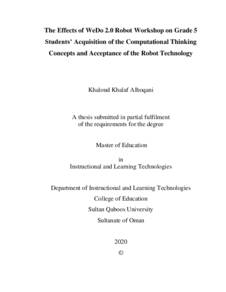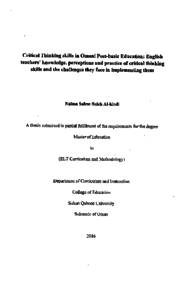Document
The Effects of WeDo 2.0 Robot Workshop on grade 5 students' acquisition of the computational thinking concepts and acceptance of the robot technology.
Publisher
Sultan Qaboos University.
Gregorian
2020
Language
English
English abstract
There has recently been a renewed interest in integrating computational
thinking skills into the school curriculum. Still, much remains to be done to
understand the convenient ways to introduce them to young students. This research
aimed to study the effects of WeDo 2.0 robot workshop on grade five students'
acquisition of the computational thinking concepts (CTCs) and their acceptance of
the robot technology used. A quasi-experimental method, One-Group Pretest-Posttest
design, was adopted to achieve the research objectives. The sample consisted of
thirty-five male and female students aged 11-12 years. The experimental group (n =
35) participated in an informal five days' robot workshop held in the Science and
Technology Centre in Al-Dakhliya region. Students got four hours of daily training
for five days (A total of 20 hours) on the computational thinking concepts using
WeDo 2.0 robot. Data were collected using two instruments: (1) pre-post
computational thinking concepts test (2) Technology Acceptance questionnaire. The
pre-posttest was implemented to measure students' acquisition of computational
thinking concepts (CTCs). The test consisted of 16 questions and aimed to assess the
students' understanding in three dimensions of the computational thinking concepts
(CTCs): Sequential control flow, Loops, and Conditionals. Seven experts determined
the pre-posttest content validity, and the internal consistency reliability (an alpha
coefficient of 0.73) of the test was measured before using it. The questionnaire was
implemented at the end of the training workshop to measure students' acceptance of
robot technology using an extended Technology Acceptance Model (TAM). Data
were analyzed using the Statistical Package for the Social Sciences (SPSS) software.
The findings of the study showed a significant improvement in grade five students'
acquisition of CTCs after attending the robot workshop and a positive acceptance of
robot technology. In light of the research findings, implications and
recommendations for future research were outlined.
Member of
Resource URL
Arabic abstract
هدفت هذه الدراسة إلى التحقق من أثر ورشة تدريبية في روبوت ) 0.WeDo2 )على اكتساب طالب الصف الخامس الاساسي لمفاهيم التفكير الحسابي وتقبّلهم لتقنية الروبوت المستخدمة في التدريب. اعتمدت الباحثة على تصميم شبه التجريبي المكون من مجموعة واحدة باختبار قبلي وبعدي لإلجابة على أسئلة البحث الحالي. تكونت عينة الدراسة من مجموعة تجريبية واحدة تتكون من 53 طالب وطالبة من طالب الصف الخامس الاساسي في محافظة الداخلية. استمرت الورشة التدريبية لمدة 3 أيام بمعدل 4 ساعات تدريب يوميا وتم تطبيقها في مركز العلوم والتكنولوجيا التابع لوزارة التربية والتعليم في محافظة الداخلية )نزوى(. ضمت أدوات جمع البيانات اختبار قبلي وبعدي لقياس اكتساب الطلبة لمفاهيم التفكير ،إحتوى على ستة عشر سؤالا الحسابي لتقييم فهم الطلبة لثالثة مجالات رئيسية في مفاهيم التفكير الحسابي و هي: تدفق التحكم المتسلسل والحلقات والشرطية. كما تم إجراء استبيان بعدي لقياس مدى تقبل الطلبة لتقنية الروبوت استنادا على نموذج TAMالموسع. أوضحت النتائج وجود فروق ذات داللة إحصائية بين متوسط درجات الاختبار القبلي والبعدي للمجموعة التجريبية لصالح الاختبار البعدي. كما أشارت الدراسة إلى التقبل الايجابي للطالب المشاركين تجاه تقنية الروبوت. وعلى ضوء هذه النتائج عرضت عددا من التوصيات والاقتراحات لمزيد من البحوث في هذا المجال.
Category
Theses and Dissertations



